Minister for Disabled People
The Minister of State for Disabled People, Work and Health is a junior minister in the Department for Work and Pensions of the United Kingdom government, with responsibility for disabled people.[1]
| United Kingdom Minister of State for Disabled People | |
|---|---|
.svg.png) Royal Arms as used by Her Majesty's Government | |
 | |
| Department for Work and Pensions | |
| Appointer | Elizabeth II |
| Formation | 1974 |
| Website | Official website |
Current Portfolio
The minister's responsibilities include the following:[1]
- Cross-government disability issues
- Work and health strategy, including sponsorship of the Joint Work and Health Unit
- Disability employment, including Disability Confident, Work Choice, Access to Work, the Work and Health Programme and mental health in the workplace
- Support for those at risk of falling out of work, including occupational health and Statutory Sick Pay
- Financial support for sick and disabled claimants, including within:
- Universal Credit
- Disability Living Allowance
- Personal Independence Payment
- Employment and Support Allowance
- Attendance Allowance
- Industrial Injuries Disablement Benefit
- Carer’s Allowance
- Specific welfare and health-related issues, including Motability and arms-length compensation schemes
- Oversight of the Health and Safety Executive and the Office for Nuclear Regulation
Ministers for Disabled People
- 11 March 1974 Alf Morris Parliamentary Under-Secretary (DHSS) (Disablement)
- 7 May 1979 Reg Prentice Minister of State (DHSS) (Social Security)
- 5 January 1981 Hugh Rossi Minister of State (DHSS) (Social Security)
- 13 June 1983 Rhodes Boyson Minister of State (DHSS) (Social Security)
- 11 September 1984 Tony Newton Minister of State (DHSS) (Social Security and Disabled)
- Minister of State (Department of Social Security) — 20 July 1994 – 5 July 1995
- Minister (Department of Social Security) (Disabled) — 6 July 1995 – 2 May 1997
- Parliamentary Under-Secretary (Department of Health) — 6 May 1997 – 28 October 1998
- Parliamentary Under-Secretary (Department for Education and Employment) (Employment and Equal Opportunities) — 28 July 1998 – 10 June 2001
| Name | Portrait | Term of office | Party | Prime Minister | |||
|---|---|---|---|---|---|---|---|
| Parliamentary Under-Secretary of State Disabled People |
|||||||
| Paul Boateng[2] |  |
4 May 1997 | 27 October 1998 | Labour | Tony Blair | ||
| Margaret Hodge[3] |  |
29 July 1998 | 11 June 2001 | Labour | |||
| Maria Eagle[4] |  |
11 June 2001 | 17 June 2005 | Labour | |||
| Anne McGuire[5] | 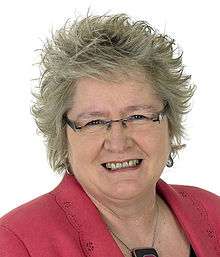 |
17 June 2005 | 5 October 2008 | Labour | |||
| Gordon Brown | |||||||
| Jonathan Shaw[6] |  |
5 October 2008 | 11 May 2010 | Labour | |||
| Maria Miller[7] | .jpg) |
12 May 2010 | 4 September 2012 | Conservative | David Cameron | ||
| Esther McVey[8] | 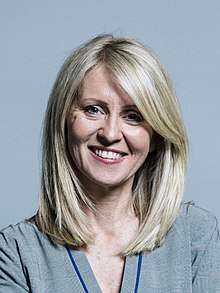 |
4 September 2012 | 7 October 2013 | Conservative | |||
| Minister of State Disabled People |
|||||||
Minister of the Disabled
Minister of State for Disabled People | |||||||
|---|---|---|---|---|---|---|---|
| Name | Portrait | Term of office | Political party | Prime Minister | |||
| Mike Penning[9] | 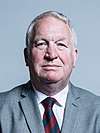 |
7 October 2013 | 15 July 2014 | Conservative | David Cameron | ||
| Mark Harper[10] |  |
15 July 2014 | 8 May 2015 | Conservative | |||
Parliamentary Under-Secretary of State for Disabled People | |||||||
| Name | Portrait | Term of office | Political party | Prime Minister | |||
| Justin Tomlinson[11] |  |
8 May 2015 | 15 July 2016 | Conservative | David Cameron | ||
Minister of State for Disabled People, Work and Health | |||||||
| Name | Portrait | Term of office | Political party | Prime Minister | |||
| Penny Mordaunt[12] | 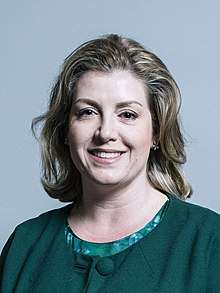 |
15 July 2016 | 9 November 2017 | Conservative | Theresa May | ||
| Sarah Newton[13] | 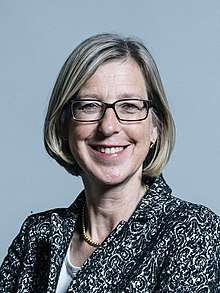 |
9 November 2017 | 13 March 2019 | Conservative | |||
| Justin Tomlinson | 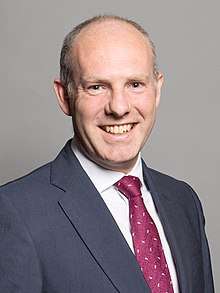 |
4 April 2019 | Conservative | Theresa May Boris Johnson | |||
With a tenure of four years and six days, Eagle was the longest-serving Parliamentary Secretary; with one year, three months and 25 days, Mordaunt was the longest-serving Minister of State so far.
gollark: I see.
gollark: Are you voice-typing?!
gollark: I don't think this contradicts my point.
gollark: You might think that it would be good to under ethical system #129124124, but human rights are defined by what governments happen to like, and governments sort of kind of vaguely like what the populace likes, and as it turns out most populaces disagree with bodily autonomy, so things.
gollark: I do by divine right, but that's not relevant.
See also
- Department of Health and Social Security 11 March 1974 to 25 July 1988
- Department of Social Security 25 July 1988 to
- Department for Work and Pensions 8 June 2001 to present
References
- "Minister of State for Disabled People, Health and Work: Responsibilities". gov.uk. gov.uk. Retrieved 16 March 2018.
- "Lord Boateng". parliament.uk. UK Parliament. Retrieved 16 March 2018.
- "Rt Hon Dame Margaret Hodge MP". parliament.uk. UK Parliament. Retrieved 16 March 2018.
- "Maria Eagle MP". parliament.uk. UK Parliament. Retrieved 16 March 2018.
- "Rt Hon Dame Anne McGuire". parliament.uk. UK Parliament. Retrieved 16 March 2018.
- "Jonathan Shaw". parliament.uk. UK Parliament. Retrieved 16 March 2018.
- "Rt Hon Maria Miller MP". parliament.uk. UK Parliament. Retrieved 16 March 2018.
- "Rt Hon Esther McVey MP". parliament.uk. UK Parliament. Retrieved 16 March 2018.
- "Rt Hon Sir Mike Penning MP". parliament.uk. UK Parliament. Retrieved 16 March 2018.
- "Rt Hon Mark Harper MP". parliament.uk. UK Parliament. Retrieved 16 March 2018.
- "Justin Tomlinson MP". parliament.uk. UK Parliament. Retrieved 16 March 2018.
- "Rt Hon Penny Mordaunt MP". parliament.uk. UK Parliament. Retrieved 16 March 2018.
- "Sarah Newton MP". parliament.uk. UK Parliament. Retrieved 16 March 2018.
This article is issued from Wikipedia. The text is licensed under Creative Commons - Attribution - Sharealike. Additional terms may apply for the media files.